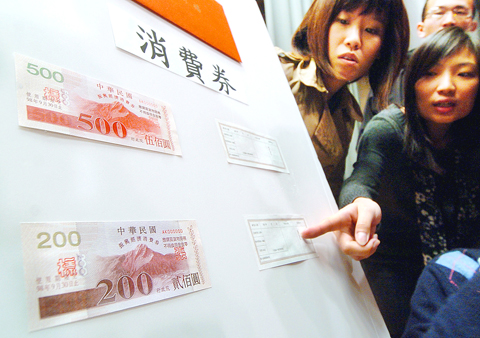The Executive Yuan yesterday displayed counterfeit-proof consumer vouchers that are modeled after paper money so people can tell if they are real just by looking at them or feeling them.
To make counterfeiting the vouchers more difficult, seven kinds of technology were used in the design, Chao Chung-shing (周中興), chief of the Technical Research and Development Office of the Central Engraving and Printing Plant, told a press conference after the weekly Cabinet meeting.
Chao said people can see gold-to-green color shifts when they rotate the paper and feel the embossed texture when they touch the vouchers because of a letterpress design.

PHOTO: FANG PIN-CHAO, TAIPEI TIMES
People will be able tell if a voucher is real by looking for a multi-layer watermark image of a plum blossom and its matched image on the opposite side when light passes through the paper.
Chao said that people can see tiny, hidden tiny characters embedded on the vouchers and different colored fibers when they are held under ultraviolet light.
The consumer vouchers are smaller than paper money, and the design features Yushan, the highest mountain in the country.
Every citizen and foreign spouse qualifying for the voucher will receive six red-colored vouchers with a face value of NT$500 each and three coffee-colored NT$200 vouchers in a “lucky envelope” with “Happy New Year” in Chinese characters on it to symbolize auspiciousness.
The government will distribute the NT$3,600 in consumer vouchers on Jan. 18, one week ahead of the Lunar New Year to boost spending.
Chou said that a voucher would be considered invalid if one-fourth of its area was damaged.

Beijing could eventually see a full amphibious invasion of Taiwan as the only "prudent" way to bring about unification, the US Department of Defense said in a newly released annual report to Congress. The Pentagon's "Annual Report to Congress: Military and Security Developments Involving the People's Republic of China 2025," was in many ways similar to last year’s report but reorganized the analysis of the options China has to take over Taiwan. Generally, according to the report, Chinese leaders view the People's Liberation Army's (PLA) capabilities for a Taiwan campaign as improving, but they remain uncertain about its readiness to successfully seize

Taiwan is getting a day off on Christmas for the first time in 25 years. The change comes after opposition parties passed a law earlier this year to add or restore five public holidays, including Constitution Day, which falls on today, Dec. 25. The day marks the 1947 adoption of the constitution of the Republic of China, as the government in Taipei is formally known. Back then the Chinese Nationalist Party (KMT) governed China from Nanjing. When the KMT, now an opposition party in Taiwan, passed the legislation on holidays, it said that they would help “commemorate the history of national development.” That

Taiwan has overtaken South Korea this year in per capita income for the first time in 23 years, IMF data showed. Per capita income is a nation’s GDP divided by the total population, used to compare average wealth levels across countries. Taiwan also beat Japan this year on per capita income, after surpassing it for the first time last year, US magazine Newsweek reported yesterday. Across Asia, Taiwan ranked fourth for per capita income at US$37,827 this year due to sustained economic growth, the report said. In the top three spots were Singapore, Macau and Hong Kong, it said. South

Snow fell on Yushan (Jade Mountain, 玉山) yesterday morning as a continental cold air mass sent temperatures below freezing on Taiwan’s tallest peak, the Central Weather Administration (CWA) said. Snowflakes were seen on Yushan’s north peak from 6:28am to 6:38am, but they did not fully cover the ground and no accumulation was recorded, the CWA said. As of 7:42am, the lowest temperature recorded across Taiwan was minus-5.5°C at Yushan’s Fengkou observatory and minus-4.7°C at the Yushan observatory, CWA data showed. On Hehuanshan (合歡山) in Nantou County, a low of 1.3°C was recorded at 6:39pm, when ice pellets fell at Songsyue Lodge (松雪樓), a